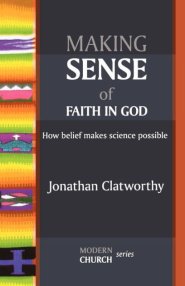This is the third book from Jonathan Clatworthy, a Christian priest and General Secretary of Modern Church which promotes liberal theology. His 120 pages are ‘not about Christianity as such’ nor does he seek to ‘defend one account of God against others’. His opening survey of ‘how we got into our present situation’ ends with unwarranted optimism: ‘the decline of atheism’ today and ‘the scientific threat to religion has now subsided’.
In seven concise chapters, each in a helpful historical and philosophical context, Clatworthy neatly describes seven reasons why he thinks it is logical to believe in God: design, values, morality, religious experience, necessary being, order, and intelligibility. Though he accepts there is no proof of God's existence, he is not willing to dispense with a designed universe, popularised by Paley, and reinforced by purposeful fine tuning, contra Darwin and Dawkins, and he uses Ockham's razor against multi-verse proponents. For him, values are not simply a human invention, founded - in Bertrand Russell's case - on ‘unyielding despair’. Instead, he believes that ‘if the values we hold are indeed part of a bigger picture of value, there must be a bigger mind that does the bigger valuing, something with an overall view of the universe’ - enter God. Any middle way ‘affirming values without God, merely claims for a godless world, qualities that can only exist in relation to God’.
His chapter on morality is perhaps his best, where he concludes that the ‘God hypothesis is the best way to make sense of morality’, providing both an authority to justify opinions, and an eternal permanence to virtues. His natural law approach ‘is a matter of discovering moral truths not merely inventing lifestyle choices’. Unlike the atheist, ‘morality based on God is a morality of hope’. The book's title, Making Sense of Faith in God is successfully argued unlike the sub-title. Clatworthy's point is not how belief makes science possible but how it makes science more rational. He shows that scientists require faith in presuppositions they cannot prove: they have to take on trust that the world is both ordered and intelligible to human minds. But at times he claims too much. If there is no necessary being as God, ‘not only do we have no reason to believe in God, we have no reason to believe in science either’ because for Clatworthy reliable knowledge requires a ‘reliable necessary being giving the universe its coherence’ - an assertion unlikely to convince atheist scientists.
Trustpilot





